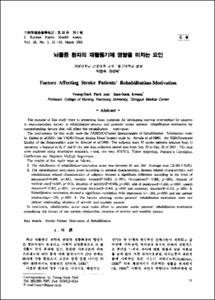뇌졸중 환자의 재활동기에 영향을 미치는 요인
- Affiliated Author(s)
- 박영숙
- Alternative Author(s)
- Park, Yeong Sook
- Journal Title
- 대한보건연구
- ISSN
- 1738-3897
- Issued Date
- 2002
- Abstract
- The purpose of this study were to presenting basic materials for developing nursing intervention for patients to reaccommodate society in rehabilitation-process and promote stroke patients' rehabilitation-motivation by comprehending factors that will affect the rehabilitation - motivation.
The instruments for this study were the PAREMO(Patient Questionnaire of Rehabilitation- Motivation) scale by Hafenl et al(2001), the VAMS(Visual Analog Mood Scales) scale by Arruda et al(1999), the EQR(Emotional Quality of the Relationship) scale by Kreuter et al(1996). The subjects were 82 stroke patients selected from D university's hospital in K, P and B city and data collection period was from Sep. 20 to Oct. 20 of 2001. The data were analyzed using descriptive statistics, t-test, one-way ANOVA, Tukey inspection, Pearson's Correlation Coefficients and Stepwise Multiple Regression.
The results of this study were as follows;
1. The distribution of rehabilitation-motivation score was between 87 and 164 Average was 121.80(±19.62).
2. The rehabilitation-motivation score according to general characteristics, disease-related characteristics and rehabilitation-related characteristics of subjects showed a significant difference according to the level of education(F=6.488, p=.001), monthly income(F=5.653, p=.005), Occupation(F=-2.866, p=.005), channel of medical use(F=4.602, p=.013), situation of activity(F=9.006, p=.000), site of paralysis(F=7.333, p=.000), speech disorder(F=6.267, p=.001), sensational disorder(F=9.401, p=.000) and excretory disorder(F=8.111, p=.000). 3. Rehabilitation-motivation showed a significant correlation with depression (r=-.393, p=.000) and sex partner relationship(r=.519, p=.000). 4. The factors affecting stroke patients' rehabilitation-motivation were sex partner relationship, situation of activity and monthly income.
In conclusion, rehabilitation nurse must make effort to promote stroke patients' rehabilitation-motivation considering the factors of sex partner relationship, situation of activity and monthly income.
본 연구는 뇌졸중 환자의 재활동기에 영향을 미치는 요인을 파악하여 재활동기를 증진시키기 위한 간호중재의 기초자료 제공을 목적으로 하는 서술적 조사연구이다.
연구대상은 K, P와 B시의 D대학부속 한방과 양방 병원 신경내과•신경외과, 재활의학과 외래(4개 병 원)를 통원 치료하거나 퇴원하여 집에서 기거하는 뇌졸중 환자 82명이며, 연구도구로 재활동기는 Hafen 등(2001)의 PAREMO 도구를, 우울은 Arruda 등(1999)의 VAMS 도구를, 부부관계는 Kreuter 등(1996)의 EQR도구률 이용하였다.
자료수집은 2001년 9월 20일부터 10월 20일까지 자가보고 방식과 우편설문지를 이용하였고, 자료분석은 SPSS package 10.0으로 기술적 통계,t-test와 One-Way ANOVA 및 Tukey 검증, Pearson's Correlation coefficient, Stepwise Multiple Regression Analysis률 이용한 결과는 다음과 같다.
1. 재활동기의 점수는 최소 87점에서 최대 164점 까지 분포하였으며, 평균은 121.80(土19.62)점이였다.
2. 연구 대상자의 일반적 특성, 질병관련 특성, 재 활관련 특성에 따른 재활동기의 점수는 교육정도(F=6.488, p=.001), 월수입(F=5.653, p=.005), 직업(F=-2.866, p=.005), 의료이용 경로(F=4.602, p=.013), 활동상태(F=9.006, p=.000), 신체마비 부위(F=7.333, p=.000), 언어장애(F=6.267, p=.001), 감각장애(F=9.401, p=.000), 배설장애(F=8.111, p=.000)에서 유의한 차이가 나타났다.
3. 재활동기와 우울(r=-.393, p=.000), 부부관계 (r=.519, p=.000)는 유의한 상관관계가 있는 것으로 나타났다.
4. 재활동기에 영향력올 미치는 변인은 부부관계, 활동상태, 월수입이며, 재활동기는 분산의 43.7%를 설명하였다.
결론적으로, 뇌졸중 환자의 재활동기에 영향을 미치는 요인으로는 부부관계, 활동상태, 월수입으로 이 중에서 가장 중요한 요인은 부부관계임이 확인됨으로 이들 요인을 증진시키는 간호중재가 필요하다고 사료된다.
이상의 연구결과를 토대로 다음과 같은 제안을 하고자 한다.
1. 뇌졸중 환자의 재활동기를 증진시킬 수 있는 간호중재외 개발이 필요하다.
2. 뇌졸중 환자의 재활동기에 가장 중요한 영향요인은 부부관계이므로 성공적으로 재활동기를 증진시키기 위해서는 부부관계를 촉진시키는 전략적 요소가 고려되어야 한다.
3. 대상자를 질병의 회복단계별로 구분하여 재활 동기를 연구할 것올 제언한다.
- Alternative Title
- Factors Affecting Stroke Patients’ Rehabilitation-Motivation
- Department
- Dept. of Nursing (간호학)
- Publisher
- College of Nursing
- Citation
- 박영숙 and 권삼숙. (2002). 뇌졸중 환자의 재활동기에 영향을 미치는 요인. 대한보건연구, 28(1), 21–30.
- Type
- Article
- ISSN
- 1738-3897
- Appears in Collections:
- 2. College of Nursing (간호대학) > Dept. of Nursing (간호학)
- 파일 목록
-
-
Download
 oak-bbb-1205.pdf
기타 데이터 / 693.21 kB / Adobe PDF
oak-bbb-1205.pdf
기타 데이터 / 693.21 kB / Adobe PDF
-
Items in Repository are protected by copyright, with all rights reserved, unless otherwise indicated.